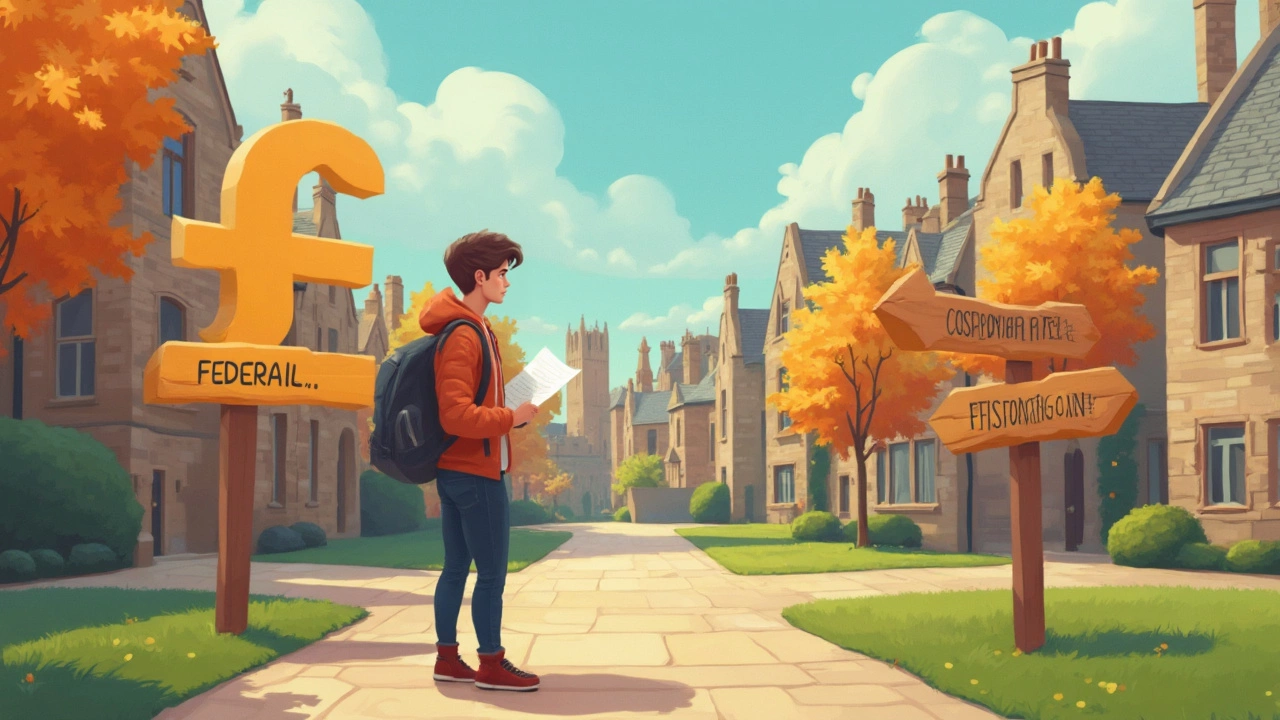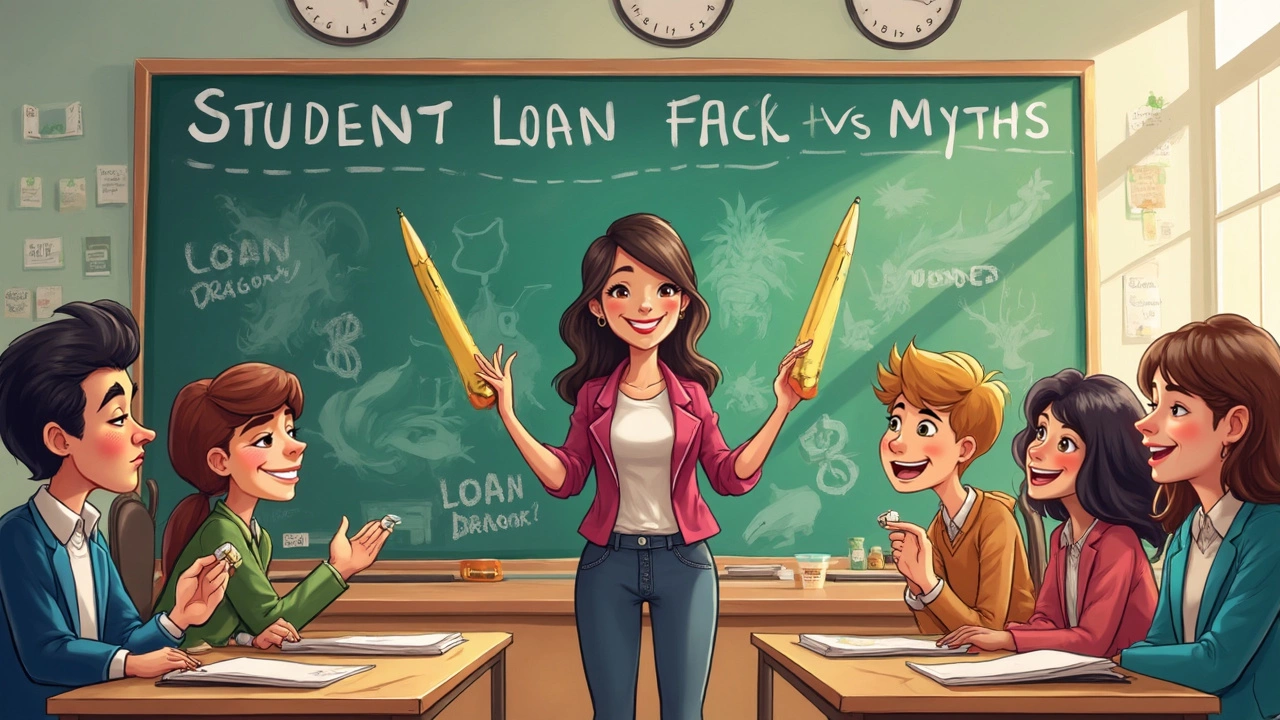Everybody talks about the mountain of student debt, but you hardly ever hear about getting to the top of that mountain: the approval. Is it a tough climb or more like a walk in the park? Honestly, the answer depends on the kind of loan you’re after and what’s in your credit report—or your parents’, if you need a cosigner.
Let’s not make it sound scarier than it is. If you’re going for a federal student loan, you usually just fill out the FAFSA form and check the boxes for citizenship and your school's info. Most of the time, they don't care about your credit score or even if you have one. Private student loans, though, are a different story. Here, lenders actually dig into your financial history, look at your income, your debt, and even how steady your job (if you have one) is. Your cosigner’s background matters too.
Here’s a wild fact: The U.S. Department of Education gives out about 95% of all student loans, so federal loans are way easier to get than private ones. Some students never see a denial for federal loans, unless they've maxed out yearly or lifetime limits, or have defaulted on a previous loan. Private lenders, on the other hand, can and do say no if you don’t fit their mold.
- Federal vs. Private Student Loans: The Basics
- What Lenders Look For
- Surprising Reasons People Get Denied
- Tips to Boost Your Approval Odds
- After a Denial: Your Next Moves
Federal vs. Private Student Loans: The Basics
When you start searching for student loan approval, you'll run into two main types: federal and private. They sound similar, but the way you get them—and how hard it is to get them—couldn't be more different.
Federal student loans are backed by the government, and they make it pretty easy to say yes. You don’t need to worry about your credit or your family’s income for most types. The only thing you really need to do is fill out the FAFSA (Free Application for Federal Student Aid) and meet some citizenship and school requirements. That’s it. You could have no credit history at all and you'll still likely snag a federal loan. They don't run a credit check for most undergrads, and you don’t need a cosigner either. This is a big deal for anyone just starting out and with zero financial history.
On the other hand, private student loans are a different beast. These come from banks, credit unions, or online lenders—not the government. They act a lot like any other loan. Lenders check your credit, look at your income, and may want a cosigner, especially if your credit’s new or not so hot. Private loans might offer larger amounts or cover things federal loans won’t, but the bar to get approved is much higher. No strong credit or cosigner? It’s pretty common to get denied here.
Take a look at how the basics stack up:
| Loan Type | Credit Check? | Needs Cosigner? | Typical Approval Time |
|---|---|---|---|
| Federal | No* | No | Fast (after FAFSA & school certifies) |
| Private | Yes | Usually if under 21 or no credit | Can take days or weeks |
*With the exception of federal PLUS loans, which do have a basic credit check.
One more thing: Federal loans usually come with perks private ones don’t—like options to pause payments, lower your monthly bill if money’s tight, or even get your loan wiped out through forgiveness programs. So, if you’re worried about getting approved and want the easiest path, federal is almost always the way to go first.
What Lenders Look For
Lenders don’t just throw cash at anybody asking for student loan approval. They’ve got a checklist, and different rules come into play depending on if you’re trying for a federal or private student loan.
Federal student loans are probably the easiest to get. The U.S. Department of Education mostly looks at these things:
- Are you a U.S. citizen or eligible non-citizen?
- Do you have a valid Social Security number?
- Did you fill out the FAFSA form correctly?
- Are you accepted or enrolled in a real, approved college or trade school?
- Are you making progress toward your degree, or did you default on a previous loan?
Your credit score? Not even checked for most federal loans, like Direct Subsidized or Unsubsidized Loans. For PLUS loans, which are often for grad students or parents, there is a basic credit check, but they’re mainly looking for big negatives (like recent bankruptcy or defaulted debts—not a low score in general).
Things get a lot stricter with private student loans. Here’s what those lenders want to see before saying yes:
- Your credit score – usually 650 or higher for most banks
- Income – do you (or your cosigner) have steady money coming in?
- Debt-to-income ratio – how much other debt do you, or your cosigner, already have?
- School enrollment status
- What year you are in school (some only loan to juniors/seniors who are less likely to drop out)
- Cosigner’s credit and financial situation, if you need one (which most undergrads do)
Private lenders use these numbers to figure out: "Will this person actually pay us back?" If you or your cosigner have had big financial problems like a car repo, late payments, or high credit card debt, expect them to dig deeper or turn you down. If you want to see how strict private lenders can get, check this out:
| Factor | Federal Loans | Private Loans |
|---|---|---|
| Credit Score Required | No (except PLUS loans) | Yes (usually 650+) |
| Income Check | No | Yes, always |
| Cosigner Needed | Rarely | Usually for undergrads |
| FAFSA Required | Yes | No |
If you’re worried about not having a credit history or a high income yet, federal loans are your friend. Private loan approval is more like applying for a credit card, so knowing what they look for gets you ready long before you hit "submit."

Surprising Reasons People Get Denied
Most people expect to be denied student loan approval because of a bad credit score, but that’s not the only thing that can trip you up. Some reasons are way less obvious—and a bit frustrating.
Did you know unpaid parking tickets can mess things up? If you skip out on even small debts owed to your school or local agencies, your financial aid could get held up. Colleges call this a “hold,” and the government won’t send loan money until it’s cleared. That late library fee or chunk missing from your tuition bill? It’s more important than it seems.
Another head-scratcher: enrolling less than half-time. For most federal and private loans, you need to be at least a half-time student. Drop below that—say, three credits in a semester—and you could get denied or even lose loans you already had lined up.
- FAFSA mistakes tank more applications than you’d think. Entering the wrong Social Security number, missing the signature, or mixing up tax info can all get you flagged.
- If you’ve defaulted on a previous college loan, you’re going to face trouble until things are cleared up, especially with federal loans.
- Private college loans also care about your income-to-debt ratio. If you’ve got a bunch of credit card debt, even if you pay on time, lenders might see you as risky.
Sometimes your cosigner’s issues become your issues. If their credit isn’t up to par, or if they have lots of debt, private lenders can turn you down, even if your own situation is spotless.
Here’s a quick look at a few real reasons students got denied for loans in 2024:
| Denial Reason | Federal Loans | Private Loans |
|---|---|---|
| Missing FAFSA signature | ✅ | ❌ |
| Less than half-time enrollment | ✅ | ✅ |
| Poor cosigner credit score | ❌ | ✅ |
| Too much existing debt | ❌ | ✅ |
| Default on previous student loan | ✅ | ✅ |
Bottom line: sometimes it’s not even about your grades or ambition. Details matter—a lot. Before you apply for any student loan, double-check everything. Your best shot? Pay off random little debts and fill every blank with care.
Tips to Boost Your Approval Odds
If you’re nervous about getting the green light for a student loan approval, you’re definitely not alone. Here’s what actually moves the needle when you apply.
- Fill out the FAFSA early. Especially for federal student loans, timing can be everything. Some states and colleges hand out their aid on a first-come, first-served basis. Get your application in as soon as the window opens.
- Get your documents in order. Seriously, double-check social security numbers, legal names, income info, and your family size. An estimated one in three FAFSA forms get held up every year because of basic errors or missing signatures.
- Know your credit score if you’re going private. Most private lenders want to see a score in the 600s or higher, and the best rates usually go for 700 or more. If your score isn’t there yet, see if you can pay down some credit card debt or ask a parent with good credit to cosign.
- Cosigner matters for private loans. Almost all undergrads need one because they haven’t built up enough credit. Lenders look for cosigners with steady income and a clean repayment record. If your first choice gets denied, try another trusted adult.
- Limit existing debt. Private lenders care about your debt-to-income ratio. If you or your cosigner are juggling lots of loans or maxed cards, your odds aren’t great. Try to pay off small debts before applying, or wait until a few balances go down.
- Apply to multiple lenders. Don’t stick to just one private lender. Each has their own formula, so if one turns you down, another might say yes (or give you a better rate anyway).
Here’s a quick look at what private lenders usually require and what the average approved applicant looks like:
| Requirement | Typical Numbers (2024) |
|---|---|
| Minimum credit score (student or cosigner) | 670+ |
| Debt-to-income ratio | Less than 40% |
| Annual income (cosigner) | $35,000+ |
Bottom line: Federal student loans are low-hassle, but if you need a private loan, prep your paperwork, fix what you can on your credit, and bring a strong cosigner along. Little details—like a middle initial that doesn’t match—trip up real applications every year. So triple-check everything before you hit submit. Getting that college loan approval is part smart strategy and part staying organized.

After a Denial: Your Next Moves
If a student loan approval doesn’t come through, it feels frustrating—but you’ve got options. First, dig into the reason for the denial. Private lenders usually send a letter or email saying what tripped them up. It’s often a low credit score, too much debt, or missing info about your (or your cosigner’s) income.
Here’s what you can do next to keep the college plans alive:
- Appeal the decision: Some lenders let you appeal if you can update your info or explain why certain things on your credit report don’t reflect your real situation. If your cosigner just paid off a huge debt or you got a new job, send in proof.
- Apply with a different cosigner: Lenders care a lot about cosigners. If yours was denied because they’ve got shaky credit, try asking someone else with a steady income and solid credit history.
- Request a smaller loan: If your requested amount seemed risky to the lender, lower it. Only borrow what you truly need for tuition and essentials—that way, your debt load looks less scary to lenders.
- Build your credit: This option takes a bit longer, but making a few on-time payments on a credit card, or paying off a car loan, can give your score a boost. Check your credit report at AnnualCreditReport.com to spot mistakes you can fix quickly.
- Try for federal student loans: If you only applied for a private loan, see if you’re still eligible for federal aid by filling out the FAFSA. Federal student loans don’t do a credit check for most types (except PLUS loans).
Here’s a quick look at some key eligibility differences for federal versus private student loans:
| Loan Type | Credit Check? | Cosigner Needed? | Common Reasons for Denial |
|---|---|---|---|
| Federal (Subsidized/Unsubsidized) | No | No | Defaulted loans, citizenship status |
| Federal (PLUS) | Yes (Adverse History) | Maybe | Bad credit history |
| Private | Yes | Often | Low credit, low income, high debt |
If you’re still coming up short after trying these steps, look at scholarships, grants, or asking your college’s financial aid office for more guidance. Schools sometimes offer emergency loans or payment plans, especially if you explain your situation early.
Bottom line: A student loan approval denial isn’t the end of your school journey. With a bit of troubleshooting and some hustle, you can line up another shot at financial aid or piece together other ways to cover school costs.






